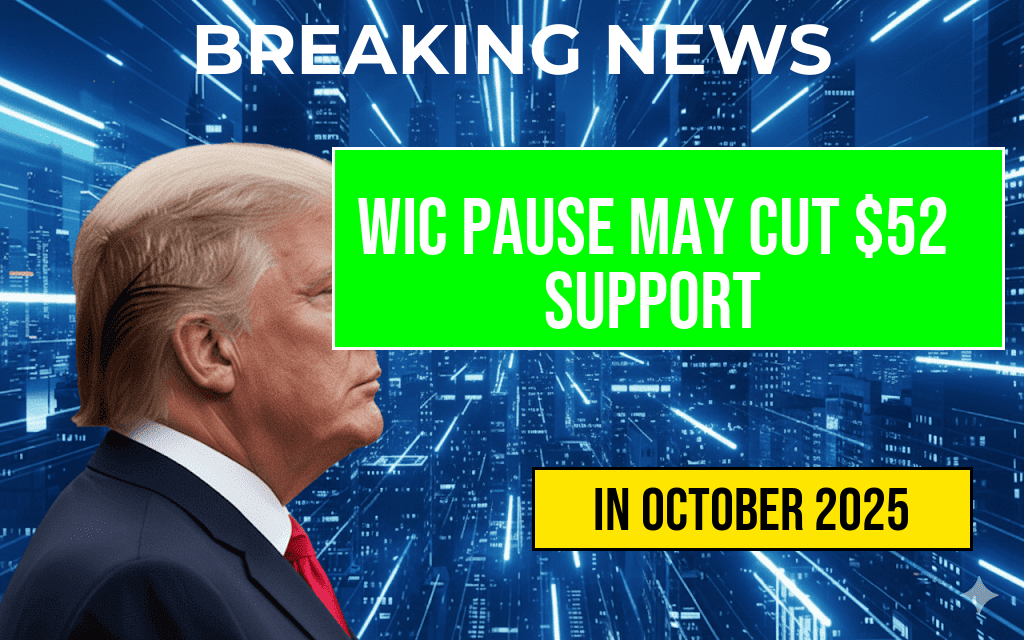WIC Program Pause Could Reduce $52 Monthly Support for Breastfeeding Parents; Food Banks Prepare for Impact
A recent pause in the Special Supplemental Nutrition Program for Women, Infants, and Children (WIC) could leave thousands of breastfeeding families facing a significant reduction in monthly assistance, potentially losing approximately $52 in support. The interruption, which affects the distribution of WIC benefits, comes at a critical time when many families rely on the program to afford nutritious foods and breastfeeding supplies. As federal officials work to address the suspension, community organizations and food banks are bracing for increased demand, preparing to help families cope with the shortfall. This pause underscores ongoing debates over federal nutrition programs’ funding stability and highlights the need for alternative support mechanisms for vulnerable populations.
Understanding the WIC Program and Its Role in Breastfeeding Support
The WIC program, administered by the U.S. Department of Agriculture (USDA), provides nutrition assistance, education, and resources to low-income pregnant and postpartum women, infants, and young children. One of its key components is the provision of vouchers for healthy foods, including breastfeeding supplies such as breast pumps and formula alternatives. The program aims to promote optimal infant health and development by encouraging breastfeeding, which is widely recognized for its health benefits for both infants and mothers.
According to the USDA, WIC benefits are tailored to meet the nutritional needs of participating families, with a particular emphasis on supporting breastfeeding mothers. The program typically offers monthly stipends that help cover the costs associated with breastfeeding, making it easier for new mothers to choose and sustain breastfeeding practices. A disruption in these benefits, especially the $52 monthly support for breastfeeding supplies and nutritious foods, could have tangible consequences for families relying on this assistance.
Reasons Behind the Program’s Pause and Its Immediate Effects
The pause stems from federal funding uncertainties and administrative delays in processing new or renewed WIC benefits. While the exact duration of the suspension is unclear, experts warn that even temporary interruptions can disrupt breastfeeding routines and nutritional plans. For many families, the loss of supplemental income—averaging around $52 per month—may force difficult choices between purchasing essential foods or maintaining breastfeeding support supplies.
Health advocates emphasize that consistent access to breastfeeding support and nutritious foods is critical during the first year of an infant’s life. Interruptions can lead to decreased breastfeeding rates, which may impact infant health outcomes, including immune function and developmental milestones. Moreover, families with limited financial resources often find it challenging to bridge the gap without external assistance.
Community Response and Food Bank Preparedness
As the WIC pause continues, local food banks and community organizations are mobilizing to meet the anticipated increase in demand. Many are expanding their inventories of infant formula, baby foods, and breastfeeding supplies, including pumps and nutritional supplements. Some agencies are also launching outreach initiatives to inform families about alternative resources and eligibility criteria for other federal or state assistance programs.
| Aspect | Potential Effect |
|---|---|
| Monthly support loss | Approximately $52 reduction per family in breastfeeding-related benefits |
| Breastfeeding rates | Possible decline due to reduced access to supplies and encouragement |
| Food bank demand | Expected increase in requests for infant foods and breastfeeding supplies |
| Community response | Enhanced outreach, resource redistribution, and partnership development |
Broader Implications and Policy Considerations
The temporary suspension highlights vulnerabilities in federal nutrition programs and raises questions about long-term funding stability. Experts argue that consistent support is vital to maintaining breastfeeding rates and ensuring the health of infants from low-income families. Advocacy groups are calling on policymakers to prioritize funding increases and streamline benefit distributions to prevent future disruptions.
Additionally, the situation underscores the importance of community-based support systems in supplementing federal efforts. Local health departments, non-profits, and advocacy organizations stress the need for ongoing education about breastfeeding benefits and available resources, especially during periods of program interruption.
For families seeking assistance, options include applying for other aid programs such as the Supplemental Nutrition Assistance Program (SNAP) or reaching out to local WIC clinics for guidance on eligibility and alternative resources. The USDA has also provided guidance on navigating temporary benefit changes, emphasizing the importance of maintaining communication with program administrators.
Sources and Further Reading
Frequently Asked Questions
What is the reason for the WIC Program pause mentioned in the article?
The WIC Program pause is due to funding or administrative issues that temporarily halt support services for breastfeeding parents, potentially impacting their monthly assistance.
How could the $52 monthly support for breastfeeding parents be affected?
The pause in the WIC Program could lead to a reduction of approximately $52 in monthly support for breastfeeding parents, affecting their ability to afford necessary supplies and nutrition.
What preparations are food banks making in response to this situation?
Food banks are preparing for an increased demand for food assistance as some families may lose or see a reduction in WIC benefits, aiming to support those affected by the program pause.
Who is most impacted by the WIC Program pause?
Breastfeeding parents who rely on WIC benefits for nutrition and supplies are most impacted, which could affect their breastfeeding journey and overall family well-being.
Is the WIC Program expected to resume soon?
The article does not specify an exact timeline, but the pause suggests a temporary disruption, and affected families are advised to stay informed about updates from WIC officials.










